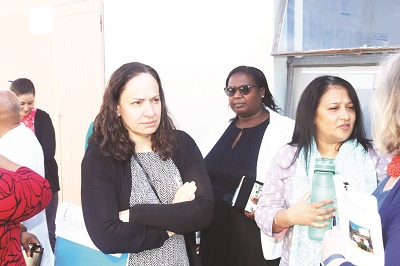Lesotho is reportedly one country with the highest Tuberculosis (TB) incidences. According to the World Health Organization (WHO) Lesotho has dropped by 13% translating to 661 cases per 100 000 population over the past decade.
Earlier this year, the Country TB Programme Dr Llang Maama tells this publication that despite some challenges, Lesotho has made positive progress in combating TB.
During her visit to the country, the Acting Deputy Assistant Administrator in the United States Agency for International Development (USAID)’s Bureau for Global Health Carmen Coles conducted tours of health centers to gain insights into the progress made in the fight against TB.
The USAID support to Lesotho in the fight against TB has been crucial over the years. Her overall assessment has been positive, as she commends the country for strides in combating TB. Thoboloko Ntšonyane engages her to find out if the investment made by the USAID in the fight against TB are paying off.
Below are excerpts of the interview.
What is your overall assessment of TB fighting initiatives in Lesotho?
Lesotho has made commendable progress in its TB fighting initiatives, with support from various development partners including USAID, PEPFAR, the World Bank, the Global Fund, and the World Health Organization.
The country’s adoption of mobile chest X-rays and the use of a four-symptom screen for TB identification, alongside community-based screening and bidirectional referrals, signify significant strides in improving TB detection and treatment. Lesotho’s efforts are crucial in light of its high TB burden, being amongst the 30 most burdened countries globally.
Is the USAID satisfied with the progress in TB reduction and treatment outcomes so far?
While USAID acknowledges Lesotho’s achievement in reaching the 2020 End TB strategy milestone of a 20% reduction in TB incidence compared to the 2015 baseline, challenges persist. The country’s high estimated TB incidence and its ability to identify only 37% of people with TB underscore the need for continued efforts.
While Lesotho maintains a stable treatment success rate above 70%, addressing mortality among TB patients, particularly those co-infected with HIV, remains a priority for improvement.
What have been some of the highlights of USAID-supported TB Programs in Lesotho?
USAID’s support for TB programs in Lesotho is multifaceted, encompassing capacity building, human resources support, diagnostic optimization, and monitoring and evaluation.
Highlights include technical assistance to the Ministry of Health (MoH), capacity building through training and supervision, support for laboratory commodities, and the implementation of digital data systems for monitoring and reporting.
Which areas in the TB programs do you believe need improvements?
Key areas for improvement in TB programs include enhancing TB case finding strategies and reducing TB-related mortality.
Strengthening TB case finding efforts is essential to ensure a higher proportion of TB cases are identified and treated promptly, while reducing mortality rates among TB patients, particularly those co-infected with HIV, is critical for improving overall treatment outcomes.
Are there future plans for USAID’s TB programs in Lesotho?
USAID remains committed to supporting the Ministry of Health in strengthening health systems and sustaining the gains made in TB response.
Future efforts will focus on enhancing TB case finding, reducing TB-related mortality, and ensuring the sustainability of TB programs in Lesotho through continued collaboration and support.


